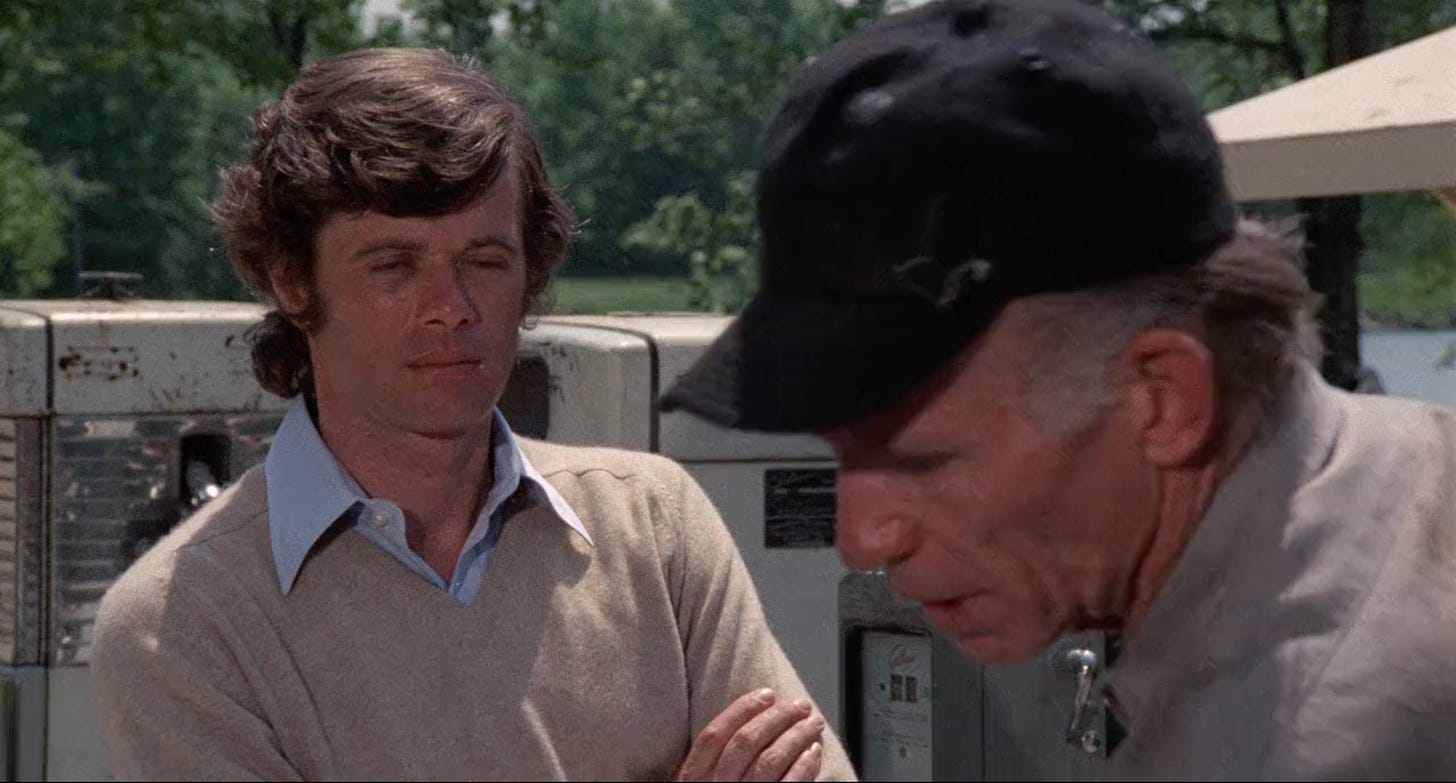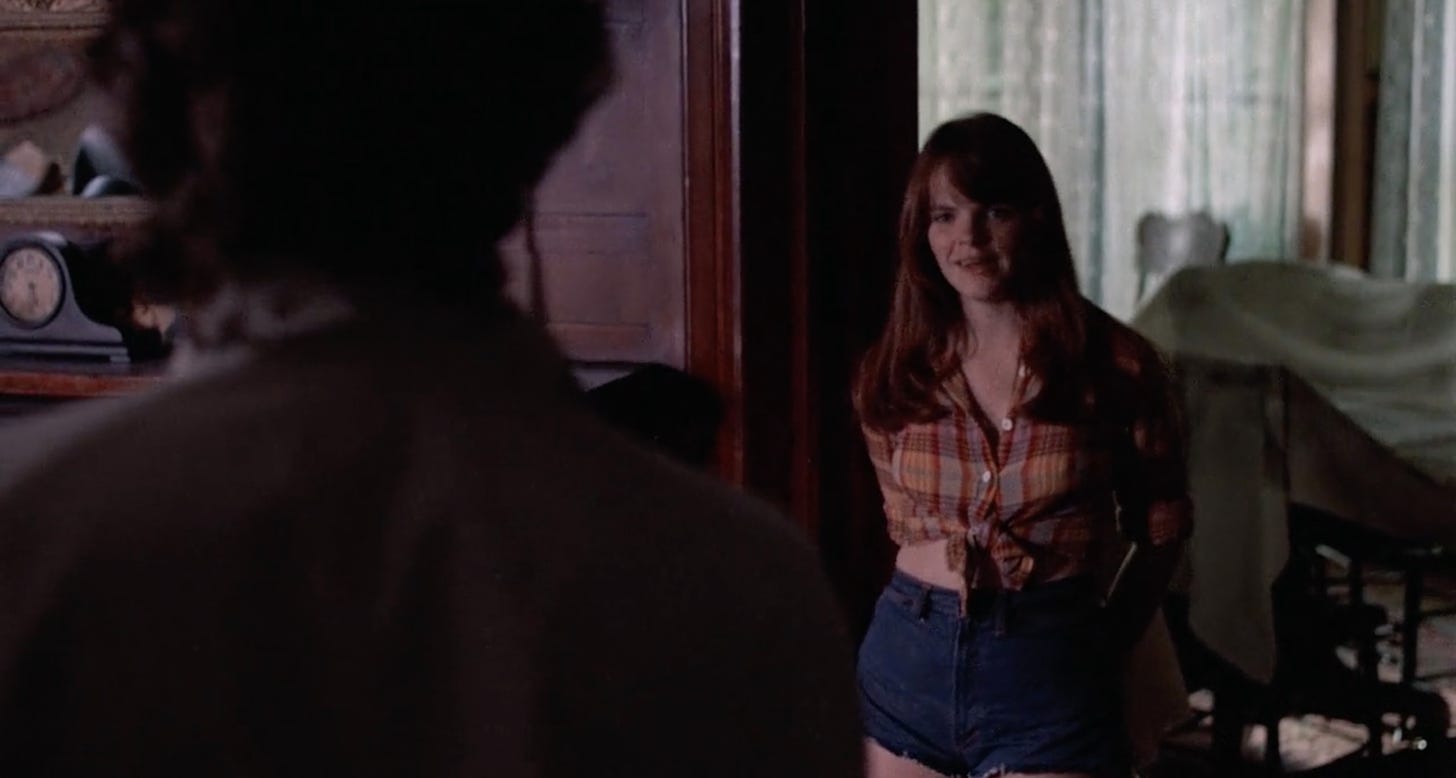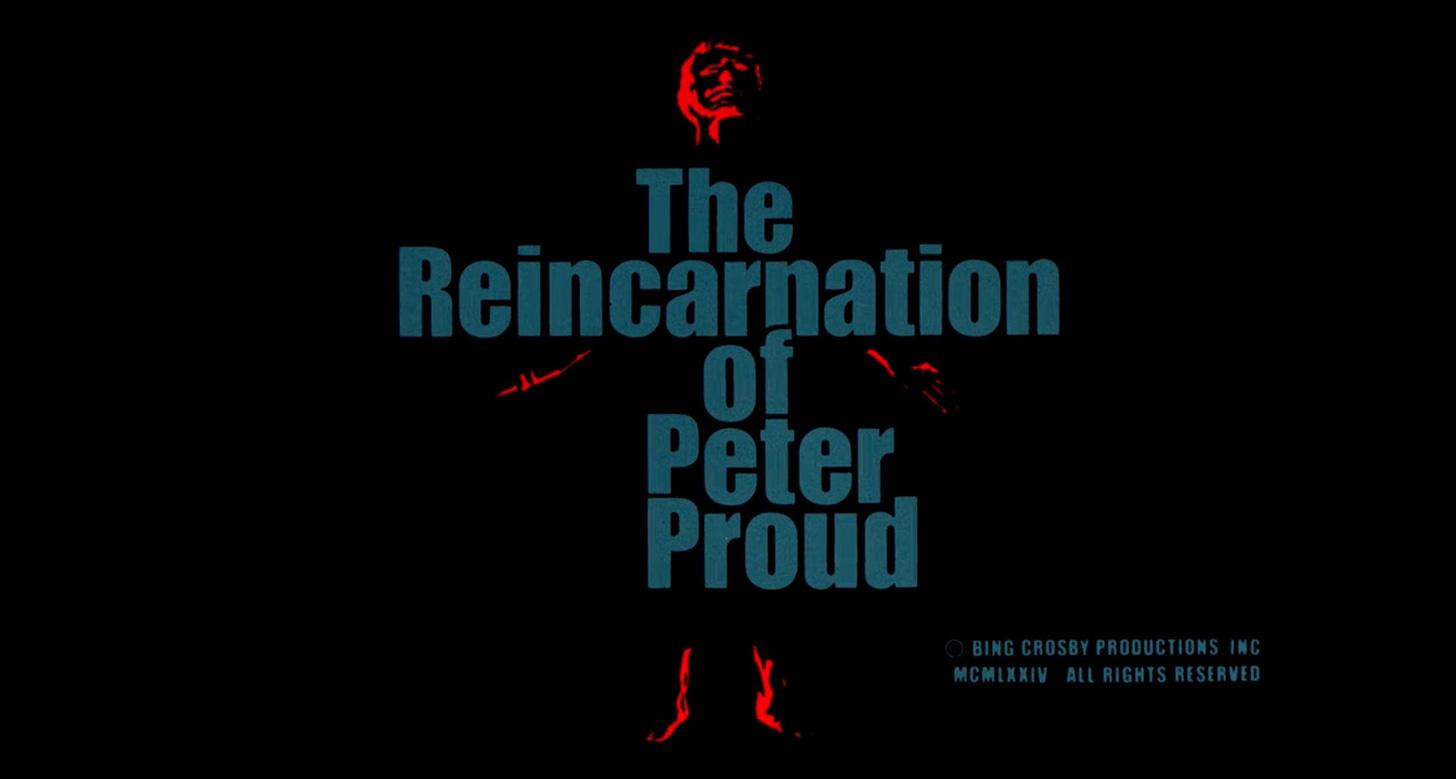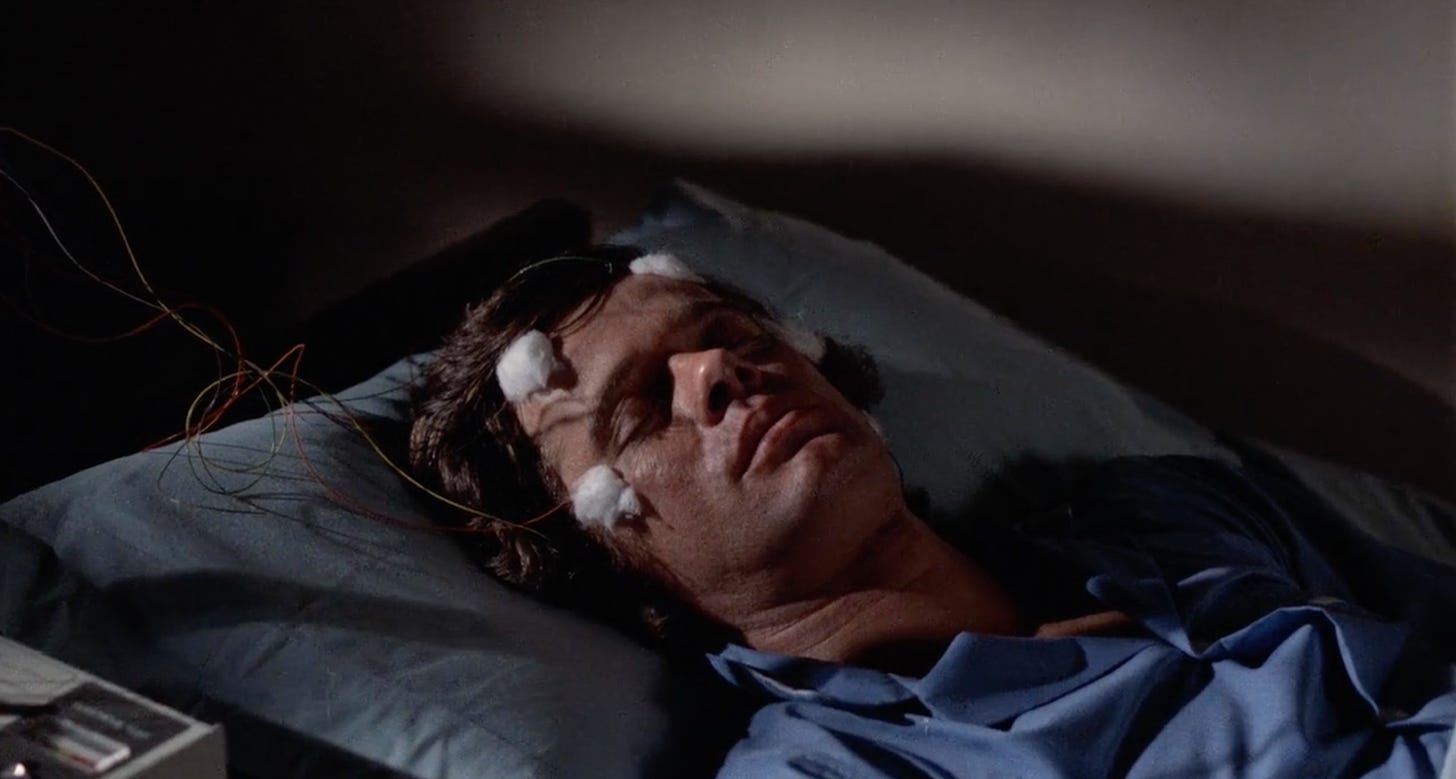As always, there are spoilers below, but this one gets spoiled like the only grandson of a wealthy dowager. Read at your own risk. If you’d like to see the film first, this, unfortunately, is one of the more harder-to-see films in this series, maybe a notch easier than Kiss Meets the Phantom of the Park. There’s currently a free YouTube upload and it’s a pretty good transfer to boot, but like anything on the Internet, clock’s ticking.
What is it? The Reincarnation of Peter Proud, directed by J. Lee Thompson, written by Max Ehrlich and based on his novel, and starring Michael Sarrazin, Margot Kidder, Jennifer O’Neill, Paul Hecht, The One and Only Steve Franken, and featuring Debralee Scott as Suzy.
First viewing? Yes, on 28 February 2023. Or was it my first viewing? (It was.) Then once again on 19 April 2023.
What’s it about? After recurring dreams of being drowned in a lake by an unknown woman, college professor Peter Proud begins to suspect that he is the reincarnation of a murdered man, and sets out to discover the truth.
What are your thoughts about it? Reincarnation. Pretty bullshit, yeah? I mean, what is even the point of it, other than maybe to reinforce oppressive social structures. You're in a dead-end job that doesn't pay your rent and you're also disabled and have no health insurance? Must've done something bad in a past life? Not like the flip of that is any better. You were a Viking chieftain who set foot on North America a thousand years ago? That's swell, bud. For my purposes, the real capper is that, as a concept, reincarnation is dramatically inert. None of that past life shit is relevant to the now of the story; at best, it's backstory. If it does impinge on the present, is reincarnation really the best vehicle for that? Maybe make that stuff from ten years ago, not ten millennia1 or whatever.
Reincarnation is pretty boring, so I was surprised to find The Reincarnation of Peter Proud, a water stained, remaindered pulp novel of a movie, completely engrossing. It does a bunch of smart things to avoid the obvious pitfalls2, the first of which is to make it a mystery. Sure, we know who killed the man in Peter's visions -- it was Margot Kidder, I saw her do it! -- but we don't know who he was, who she is, any of the context. It's a mystery as much to us as it is to him. Combine that with these visions interfering with Peter's life, and we have a terrific story engine. Peter's going to get to the bottom of this, one way or another, and a determined, obsessed protagonist is always a strong move.
The second smart choice was to put a bunch of journeyman artists in charge of this thing. The movie originated with screenwriter Max Ehrlich's novel, but by this time, Ehrlich was an old hand, with 45 film and TV credits to his name. (If there's one guy who's going to turn this nebulous concept into a tight story, it's a former newspaperman who churned out radio scripts in the '40s.) Director J. Lee Thompson should be known to you; if not, he covered a whole slew of genres throughout his career, including noir (Cape Fear), war (The Guns of Navarone), social SF (two Planet of the Apes sequels), slasher (Happy Birthday to Me), fake biopic (The Greek Tycoon), and whatever the hell The White Buffalo is (horror Western, yes, but also no). That capacity for genre shapeshifting serves the film well, as it morphs through different modes: mystery, romance, horror, psychodrama, road trip, and for one scene and one scene only, comedy. Composer Jerry Goldsmith should also be a known quantity to you: he wrote the music for the original Star Trek movies, Alien, the fanfares for Paramount and Universal, and Against the '70s entries Logan's Run and Damnation Alley. (The year after Peter Proud, he won the Academy Award for the truly spooky score for The Omen.) Here, Goldsmith opts for electronic bleepy bloops that reinforces the tale's uncanny nature, turning ordinary shots of walking down the street and highway excursions into something subconsciously disturbing. The MVP here, though, is editor Michael F. Anderson3. Anderson keeps the film moving fast enough to keep ahead of nagging questions, like "is this story using too much coincidence to push it forward?" So much so, that he appears to cut conversations down to the bone; I lost track of how many times a dialogue scene ends just as it seemed to start. He also pulls off some jagged, Nicolas Roeg-like moves, with flashbacks and visions (of a bridge, of a statue, of a childhood home) barging in unannounced, putting the audience in Peter's shoes. But Anderson pulls off something wonderful in the last third, editing footage of a local square dance to wordlessly convey two characters falling in love. It's a standout moment, constructed not just out of images but also out of rhythm, the edits getting rapider, frenzied, until we can immediately intuit the intended meaning.

The third smart choice is kind of a plot twist, although you can see it coming: Peter Proud's previous incarnation, married-into-wealth war hero Jeff Curtis, is an utter and complete slimeball. Peter, at this point, is obsessed, and I think he's having an affair with a colleague's fiancé (it's a little ambiguous), but otherwise seems like a decent, well-meaning guy. (He's given the opportunity to have no strings attached sex with a willing young woman named Suzy, and he completely ignores the moment.) Jeff is a violent womanizer, a guy who makes Aimee Mann's boyfriend in the "Voices Carry" video look like Mr. Rogers. There doesn't appear to be any real continuity between the two men. It complicates the narrative. Peter eventually involves himself with Jeff's still-living family: Jeff's wife Marcia, Jeff's mother, and Jeff and Marcia's daughter, the now-grown up Ann. What does it mean that Peter is this family's son, husband, and father, and at the same time, not?

Here's the fourth smart thing: it doesn't explain shit. It's willing to let you stew in the ambiguity. Why is Peter having these visions now? (It could be inferred that he's now the same age as Jeff when he died, but his would only be an inference.) Why would Jeff reincarnate as Peter? Or put another way, why was Peter chosen as the vessel for this reincarnation? Is this even reincarnation, or is it just the transfer of memories across time? Is there a difference? Is there some aspect of Jeff's personality, essence, whatever, in Peter? Does that personality or essence or whatever influence or control Peter? Does such a distinction matter? Does having another person's memories rolling around in your brain actually meaningful in and of itself? When Peter fucks Ann, is that the same thing as Jeff fucking his daughter?
Oh, right. That.
By the last third, Peter has learned everything he needs to know. He apparently was once Jeff Curtis, a scumbag who was murdered by his wife, and left behind an infant daughter. The wife has become an alcoholic, and the daughter, while having her own troubles, seemed to turn out pretty okay4. He has his answers; by all rights, he should just leave. But he doesn't, because he's fallen in love (or at least thinks he has) with Ann.
And here, lastly, is the fifth and final smart thing this movie does. It baldly states that there will be no explanations, because the reincarnation angle is meaningless. It's meaningless because while the visions led him here, the choices Peter made along the way were his and his alone. There is continuity between Peter and Jeff, it's just one that we weren't expecting, having been cleverly hid under the cover of Peter's role as protagonist and audience surrogate. Both men believe themselves entitled to their desires, regardless of externalities. That Peter and Jeff should share the same fate isn't ironic; it's logical. Ultimately, reincarnation is just another word for self-absorbed.
How many stars out of five? Three and a half boat oars out of five.
Where can I stream it? You can stream it on YouTube here, for however long the link lasts, and you can purchase it on blu ray from Amazon.
What can we take from it? Feels like it’s been awhile since we’ve had a real meat ‘n potatoes game material post, so let’s do that. Here’s a new focus, Can Remember Their Past Life. This one’s pretty rough and ready; I’m mostly just taking abilities out of the core rulebook and applying some light reskinning to them.
CAN REMEMBER THEIR PAST LIFE
You are the reincarnation of a completely different person who lived and died long ago, and have access to memories and skills you wouldn’t normally have.
Tier 1: Memories of School (2 Intellect points): You are trained in a knowldege skill you don't normally have. This lasts until you take your 10 hour action recovery. You may only have one skill from this ability at a time. Action.
Tier 1: Memories of Work (2 Intellect points): You are trained in a physical skill you don't normally have. This lasts until you take your 10 hour action recovery. You may only have one skill from this ability at a time. Action.
Tier 2: Vision of the Past (2 Intellect points): You have a brief vision of your previous life. You learn one random fact about a creature or location that is pertinent your current situation. Alternatively, you can choose to learn a creature's level; however, if you do so, you cannot learn anything else about it later with this ability. Action.
Tier 3: Memories of Another Self: You let the personality of a previous life take over temporarily. When you apply at least one level of Effort to an noncombat Intellect task, you get a free level of Effort on that task. Enabler.
or
Tier 3: A Friend, Both Old and New: You make contact with someone who knew your previous life. You gain a level 3 follower. They are not restricted on their modifications. Enabler.
Tier 4: Vision of the Hidden (3 Intellect points): You have a vision of your previous life that incapacitates you for five minutes. When you come to, you can learn a pertinent fact that you might otherwise never have learned. You can use this ability again after you rest for ten hours. Action.
Tier 5: Guiding Hand from the Past: When you apply a skill gained from Memories of School or Memories of Work, the task is eased by one step. Enabler.
Tier 6: Traumatic Death: You are incapacitated for ten minutes as you re-experience your past life's death. At the end of ten minutes, the next task you attempt is eased by three steps. You can't use this ability again until after you've taken a one-hour or a ten-hour recovery action. Action.
or
Tier 6: Future Incarnation (8 Intellect points): You can sense your current life is connected to, and being watched by, your next reincarnated form after you die. You can make a connection with this future self. You can ask the GM up to four questions about your current situation. Action.
GM Intrusions: You are overwhelmed by a traumatic memory from your previous life. A mannerism from your previous life gives away your secret to someone watching. The personality of your previous life briefly, yet completely, takes over, causing you to take actions or make decisions you wouldn’t normally do.
*extremely mc chris voice*
I have not, as of this date, seen the other big '70s reincarnation movie, Audrey Rose (1977, Robert Wise).
This was Anderson's second feature, so technically he wasn't a journeyman artist yet. But he would be!
So, one minor hobby I have is figuring out what might have influenced various Alan Moore comics. Moore pretty blatantly ripped off the last scene of Mad Max (1979, George Miller) for Rorschach’s backstory, and it seems clear to me that he was thinking of The Man Who Fell to Earth (1976, Nicolas Roeg) when conceptualizing Ozymandias (all the TVs, for one) and The Comedian’s death (Oliver’s assassination). Furthermore, I 100% believe that a 21 year old Moore caught Penda’s Fen (1974, Alan Clarke) on the BBC, as it totally dovetails with his current interests. (If you’ve never seen Penda’s Fen, wow, please see it.) This is all prologue to me announcing that I think I’ve found another influence, that to my knowledge no one else has discovered, and from this movie of all places. (Maybe I shouldn’t be too surprised; Moore seems like the kind of guy who absorbs all media, thinking you never know where a good idea might come from.) So: I think Moore was drawing from Marcia and her daughter Ann for Watchmen’s Silk Spectres, I and II. They have a similar relationship and a similar look, but they also have a similar backstory. In Peter Proud, Marcia is raped by Ann’s father Jeff; once Marcia clues into Peter’s secret, she wants to protect Ann from him; and in a memorable, jaw-dropping moment, Marcia masturbates while remembering Jeff raping her. Maybe it’s just me, but that maps pretty well to Eddie raping Sally, Sally trying to protect Laurie from Eddie, and Sally, later in life, consenting to sex with Eddie.









